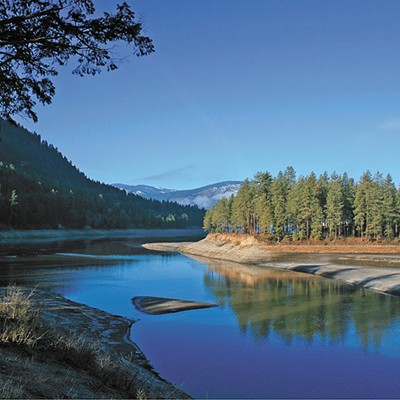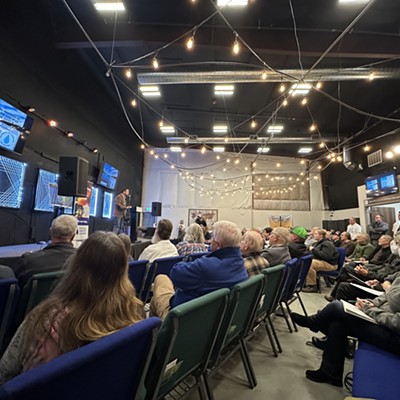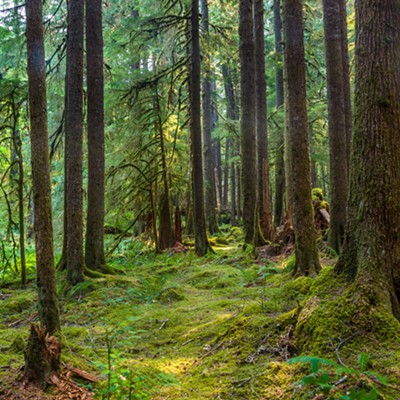This month marks the 40th anniversary of the Wilderness Act, signed in 1964 by Lyndon B. Johnson. Traditionally bipartisan, wilderness designation has been advocated by presidents as ideologically opposite as Ronald Reagan and Jimmy Carter, by hunters and animal welfare activists, by hikers and horseback riders. But some conservationists worry that recent partisan divides and election battles in Washington state are jeopardizing a piece of legislation that would officially designate 106,000 acres of Washington's remaining wild lands.
Wilderness is unruly, uncultivated; it's home to beasts and abides only by the laws of nature. So it may seem ironic that wilderness in America must be designated through state and federal acts, monitored by official agencies and specified down to particular acres on maps.
Forty years ago, America welcomed the Wilderness Act, a monumental step in preserving America's remaining wild lands. Twenty years ago last April, Washington state passed the Washington Wilderness Act, and just last weekend a variety of wilderness-loving locals teamed up with the Colville National Forest Service (CNF) to celebrate these anniversaries in the Salmo-Priest Wilderness, the lone piece of official wilderness in the 1.1-million-acre CNF.
"It was a real outpouring of everyone working hard together for something they believe in," says Cindy Reichelt, public affairs officer for the CNF. "All the groups came together surrounding that wilderness ethic."
Along with Forest Service employees, the Backcountry Horsemen from both the Inland Empire and Northeastern Washington chapters came, as did the Pacific Northwest Trails Association, the Spokane Mountaineers and the Kettle Range Conservation Group (which recently joined forces with the larger Northwest Ecosystem Alliance). The teams report that the anniversary celebration was a success; in just two days, they installed bear-proof storage containers for campers, posted vertical steel posts for horses and steel fire rings for campfires, pulled noxious weeds, took out a rotting section of trailhead and removed dead tree snags that pose fire threats. Debbie Wilkins, a recreation staff member for the Newport and Sullivan Ranger District, coordinated the wilderness project.
"After meeting, they found they weren't as far apart philosophically as they thought," she says, explaining that during a series of public meetings to create a strategic plan for recreational wilderness users, the group decided to work together on restoration.
It's not uncommon for wilderness advocates from different backgrounds and with different interests to work together. As opposed to other environmental issues, the preservation of wilderness has regularly garnered bipartisan support and collaboration among politicians and outdoorsmen. Jimmy Carter, a conservative Democrat, was nevertheless decidedly liberal in terms of wildlife preservation; he holds the record among presidents for designating the most wilderness acreage. His successor Ronald Reagan, one of the most conservative presidents in history, holds the record for signing the most wilderness bills while in office.
"Wilderness [areas] are open for horse riding, backpacking, berry and mushroom picking and more," says Derrick Knowles, outreach and volunteer coordinator for the Northwest Ecosystem Alliance, which was once the Kettle Range Conservation Group.
"People can hunt, fish and hike, but it's closed off to ATVs, mountain bikes, logging, mining, chainsaws - it keeps [the land] in a primitive, wild state." Knowles says. Though about 70 percent of Americans say they support federally designated wilderness areas, there's still heavy opposition from the timber industry, motorized recreation associations and other groups that support resource development.
"There's still a culture of seeing these lands as resource-based, and it's hard to change," Knowles explains.
Wild Sky
Despite the fact that it's the 40th anniversary of the federal Wilderness Act, and it's just after the 20th anniversary of Washington's Wilderness Act, politicians can't seem to emulate the spirit of collaboration and bipartisanship that wilderness traditionally has inspired. Case in point: The Wild Sky Bill. Authored by Sen. Patty Murray (D-WA), who is currently running for reelection, and by Rep. Rick Larsen (D-WA), the Wild Sky Bill would designate 106,000 acres of wild land in eastern Snohomish County as federally protected wilderness. The bill passed in the Senate - twice unanimously -- but is held up in the House Resources Committee by committee chair Richard Pembo (R-CA), who isn't fond of Murray or her wilderness bill.
"Pembo set rigid guidelines for getting the bill passed," says Knowles, explaining that part of what made the Wild Sky Bill so unique was that it included lower-elevation acreage, which hosts old growth trees, salmon runs and is the center for recreational use. Many existing wilderness areas are in higher elevations, where there are no roads or clear cuts and the wildlife is undisturbed. Enter 5th District Rep. George Nethercutt, who is running against Patty Murray for the U.S. Senate and who chose not to support the Wild Sky Bill when it was first introduced.
"Nethercutt came in to green his image for West Side voters and said he wanted to get the Wild Sky Bill passed," Knowles says. In addition to catering to voters west of the Cascades, Nethercutt's sudden interest in environmental legislation would work in his favor if he could say Murray wasn't able to pass her own bill and he stepped in and got it done. But after working with Larsen on a new version of Wild Sky, which Pembo also rejected, Nethercutt struck out on his own and proposed an all-new Wild Sky Bill. But his new bill excluded about 13,000 acres of the originally proposed wilderness area -- all of it in the significant lower elevations.
"Nethercutt had to bow to Pembo," Knowles says.
April Isenhower, Nethercutt's press secretary, argues that the 13,000 acres in question will gain protections, just not actual wilderness designation. "While not wilderness, [the new bill would] prohibit mining, commercial logging and impose strict limits to ensure water quality is enhanced and maintained," she says. "Congressman Nethercutt believes and continues to believe, that with Pembo leading the [House Resources] Committee, if he didn't take action now it was unlikely anything would happen in the next four yeas. It was too late to wait for protection."
The House was scheduled to vote on Nethercutt's version of the bill on Wednesday, Sept. 22. At press time, results were not available.
But Nethercutt's efforts to ride to the rescue may be backfiring: Advocates of the original Wild Sky Bill are furious over the changes he made. Many say that a congressman from California shouldn't be making decisions about wilderness designation in Washington. In addition to criticism from environmental groups, wilderness advocates and politicians who voted for the original bill, Nethercutt has endured harsh rebukes from the Seattle Post-Intelligencer, The Everett Herald and Spokesman-Review columnist Rich Landers, to name a few. If Nethercutt wanted to look green for voters, perhaps he should have used less red ink on the Wild Sky Bill -- but, then again, he wouldn't have gotten it past Pembo.
Knowles, who was a participant in last weekend's collaborative wilderness restoration in the Salmo-Priest area, says wilderness must be designated through bipartisan cooperation, as it always has been.
"This is a family issue, a community issue," he says. "It's not some radical environmental movement. It's a mainstream thing."




















